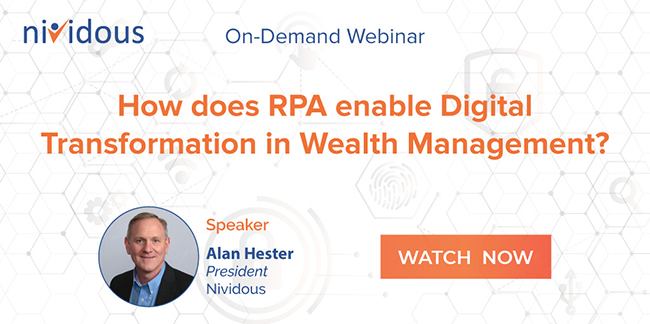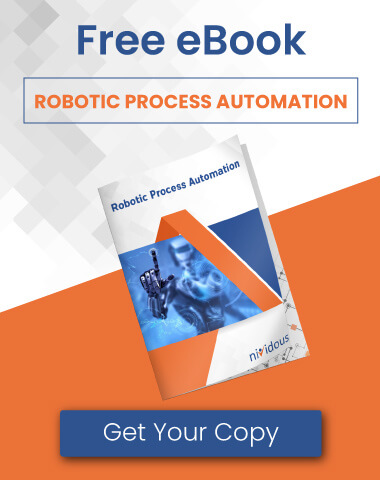The growing number of millennials are forming a whole new customer base that is more demanding and connected with technology as never before. This customer base has continually changing preferences and wants information on fingertips. Traditional wealth management companies have paper-based, manual, and time-intensive operations. The industry also faces several challenges due to continuously changing regulatory compliance. Automation has become a necessity to solve these challenges.
Robotics Process Automation (RPA) and Artificial Intelligence (AI) can bring tremendous transformation in the back-office operations helping wealth management companies to cope up with these changes. With Intelligent Automation (RPA combined with AI), organizations achieve improved productivity, efficiency, accuracy, and complete visibility. Intelligent Automation can also improve consumer-facing elements such as customer onboarding and customer service to increase customer satisfaction.
The key to implementing Intelligent Automation in wealth management is finding the right processes to automate. RPA makes the most sense when tasks are simple, manual, high volume, content-intensive, have few exceptions, and are prone to human error. AI can extend its use for more complex processes requiring human-like intelligence.
Let’s look at a few of these business process examples:
Client Onboarding
Intelligent Automation capabilities can take over the tedious job of data extraction and validation. Even verification of a customer’s image between different documents can be automated with face detection capability.
Know Your Client (KYC) authentication, form automation, elimination of hard copies/ multiple forms, and rekeying of information are some of the areas where automation can help.
Trade Processing
Trade processing and report generation, as well as several other tasks related to trade, are highly manual and data-intensive. RPA can eliminate the need to handle data files between multiple back-office systems manually. Its ability to offer a hundred percent accuracy while processing data and audit reports to trace back each action helps significantly to improve efficiency and visibility. It can also be used to automate exception handling to create and send intelligent alerts based on specific exception criteria.
Reconciliation
The Bots eliminate the need to perform time-consuming reconciliation with spreadsheets manually. The Bots can retrieve data from a variety of sources such as internal accounting systems, and external parties; format information by comparing data sets; and based on a set of rules, make corrections and adjustments.
Fund Administration/Reporting
The Bots can be trained to perform rules-based validation checks across multiple segments of the financial reporting process, enabling greater efficiency and accuracy. It also benefits compliance since tasks performed by robots will always be conducted the same way every time under the same rules. Tasks that generally take days or weeks can be completed within minutes. The offloading of these tasks from the staff allows them to focus on more customer engagement and complex tasks.
Intelligent Automation (RPA combined with AI) has become a catalyst for the growth of the wealth management industry. Prominent players in this space are also beginning to wake up to embrace these technologies. There are several real business use cases of combining AI and RPA in the wealth management domain to optimize and automate complex business processes. If you are interested to learn more, watch an on-demand webinar on “How does RPA enable digital transformation in wealth management?”






